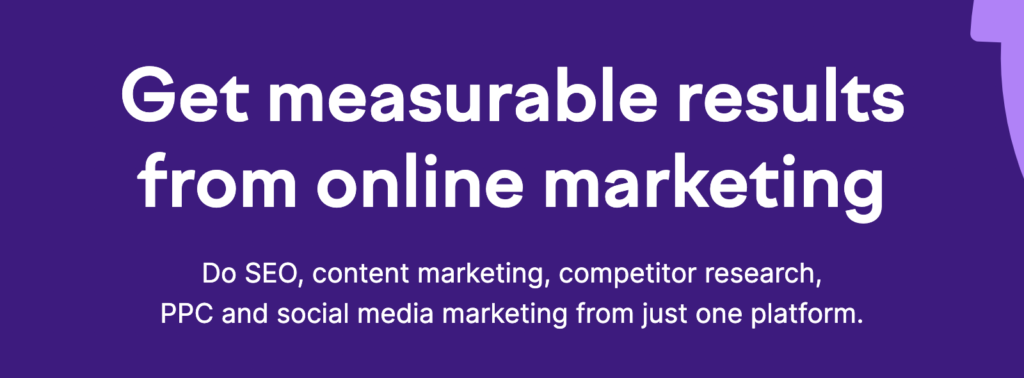Now Reading: 10 Best E-Commerce Sales Strategies To Go Sold-Out
- 01
10 Best E-Commerce Sales Strategies To Go Sold-Out
10 Best E-Commerce Sales Strategies To Go Sold-Out

Are you struggling to attract new customers, increase website conversions, and boost your e-commerce business?
Want to maximize your e-commerce sales and see your products fly off the virtual shelves?
Well, I know how it feels when you rely on each sale to keep your business growing. When I first started my drop-shipping business, I searched for various e-commerce solutions, but nothing helped a lot.
According to the statistics, 81% of clients use online search before making a purchase. And what if your website will be the first source they go to to get the products they need?
So, I’d like to share my all-in-one marketing tool for online sales that helps with SEO, content marketing, and advertising to convert visitors into buyers and boost your revenue. Whether you’re in a drop shipping business or just starting on Amazon or any e-commerce store, here are the best ten actionable ecommerce sales strategies that proved to bring results. Each strategy is easy to implement and can make a significant impact on your sales performance.
Table of Contents
- What is an e-commerce sales strategy?
- How to build a successful small business: 10 best e-commerce sales strategies
- 1. Do a market research
- 2. Optimize your website with an on-page SEO checker
- 3. Conduct an SEO audit
- 4. Find profitable keywords for your product listings
- 5. Create high-traffic content ideas
- 6. Manage business listings
- 7. Boost sales with social media presence
- 8. Do paid advertising
- 9. Optimize for Google Shopping
- 10. Use analytics for optimization
Affiliate Disclosure: some of the links in this article are affiliate links. It means that if you buy through these links, we may earn a small commission to support this website at no cost to you.
What is an e-commerce sales strategy?
An e-commerce sales strategy is a plan to increase the sales and revenue of an online store. It involves various tactics and techniques that are important for:
- attracting potential customers
- converting website visitors into buyers
- encouraging repeat purchases
- boosting eCommerce customer retention rate
Surely, that would be easy if we could just take one sales strategy and grow e-commerce business to a $1M revenue. It doesn’t work like this.
To become successful online you need to focus on multiple strategies at the same time.
The good news is you can use the only ONE effective tool for all of them – it is Semrush! And here is how.
How to build a successful small business: 10 best e-commerce sales strategies

So, if you are looking for how to increase online sales here are the best e-commerce sales strategies explaining how Semrush can help you execute all of them.
1. Do a market research
E-commerce business starts with understanding the target audience, their preferences, and buying behavior. Here is how you can use Semrush for this:
- Identify Your Competitors
Start by uncovering what keywords your competitors are ranking for. Use Semrush’s Organic Research tool to enter your competitor’s website domain and explore the keywords they are targeting. If you’re unsure who your competitors are, use the Organic Research Competitors tab for insights.
- Keyword Gap Analysis
A keyword analysis can help you find keywords your competitors rank for but you don’t. Enter your domain and top competitors into the Keyword Gap tool, select your target regional database, and hit compare.
2. Optimize your website with an on-page SEO checker
Your e-commerce website experience has an impact on the number of conversions. Start with improving the user experience, including site speed, mobile responsiveness, and easy navigation.
How to increase website conversions:
Try the On-Page SEO Checker to find and fix simple SEO issues on your e-commerce website. This tool provides ideas on how to optimize content, fix technical issues, and get backlink recommendations.
Set up your project:
- Input your landing pages and target keywords.
- Configure the crawler.
- Get fresh ideas to your email.
- Sync data from Google Analytics, Google Search Console, and Semrush’s Site Audit.
- Follow a list of actions to improve the rankings of specific pages on your website.
3. Conduct an SEO audit
Conduct a thorough site audit with Semrush Site Audit tool. With over 140 checks, this tool identifies technical issues that could be hindering your search engine rankings.
After the audit, review the dashboard for a prioritized list of issues and recommendations for fixing them.
4. Find profitable keywords for your product listings
How can you do that? Just use the Keyword Magic Tool to find profitable keywords with transactional intent. This helps you attract customers who are ready to make a purchase.
Enter your primary keyword and filter for intent to find the most relevant search terms.
What’s next?
Once you have your list of keywords, send them to the Keyword Manager for deeper insights. This tool helps you build content ideas and keyword clusters, making it easier to implement your SEO strategy.
5. Create high-traffic content ideas
Content marketing is one of the best e-commerce sales strategies. And Semrush is best for finding content ideas.
Semrush offers an AI-powered tool that generates topic ideas, writes content, and optimizes text to rank higher for your selected keywords. It’s like having an extra team of ten employees dedicated to boosting your online presence.
Try Semrush to streamline your content creation process for maximum SEO impact.
6. Manage business listings

With the Semrush Listing Management tool, you can update your e-commerce business information across multiple directories in one place. This includes details like your name, address, phone number, and store hours.
You can list your business in over 70 top directories, including Yelp, TripAdvisor, Facebook, and Apple Maps.
Besides, you can get access to a Local Listings checker to maintain a strong local presence:
- Visibility score provides information about online visibility in local directories.
- A listing presence will help you identify all the directories where your business is currently listed.
- Reviews management saves you time by giving an overview of customer reviews across various platforms.
- Star ratings information allows you to monitor average star ratings to understand customer satisfaction and areas for improvement.
7. Boost sales with social media presence
What I like about Semrush is its so many features in one place. As an eCommerce business owner, you know how important social media is for:
- building an attractive brand
- increasing sales
- building loyalty
So, you can easily schedule and automate your social content posts with Semrush.
What actually can you do with it?
- Track all your competitors’ social media accounts
- Follow top social media accounts in your niche and discover the best trends early
- Schedule and share posts to Instagram, Facebook, Twitter, Pinterest, LinkedIn, and Google Business Profile
- Create content and manage your approval process
Besides, you can track your KPIs and get emails with automated reports.
8. Do paid advertising
Organic traffic is an effective long-term strategy. Paid advertising is crucial for achieving immediate visibility, reaching targeted audiences, and driving e-commerce sales.
How to use Semrush for paid advertising:
- Search competitors to identify the key players in your market.
- Monitor PPC Activities by tracking competitors’ ad spends, identifying their most profitable ad copy, and understanding their advertising strategies.
- Analyze Google Ads Trends and adjust your campaigns accordingly.
- View Live Ads to understand their current messaging and positioning in the market.
- Discover keywords. You can view keywords and ad texts for over 100 countries, and in more than 20 languages.
9. Optimize for Google Shopping
Does Google Shopping optimization seem like a puzzling riddle? Optimize your campaigns using PLA data.
How does it work?
- Enter a domain, subdomain, or URL, such as ebay.com, bestbuy.com, or amazon.com.
- Research competitors’ Product Listing Ads (PLAs).
- Discover ads for specific keywords, and their positions in paid search, and view the number of search queries triggering your rivals’ PLAs.
You can analyze leading advertisers among your Google Shopping competitors and modify your strategy.
10. Use analytics for optimization
To stay on track and grow your e-commerce sales, you should monitor business performance and make data-driven adjustments. Here are the three simple tools you need:
Google Analytics to track user behavior, conversion rates, and sales performance. Pay attention to e-commerce-specific reports.
Google Ads to get insights into paid advertising performance, including click-through rates, conversion rates, and return on ad spend (ROAS).
Semrush to track website SEO and access the market growth opportunities.
FAQs
1. Website conversions vs clicks to website – what is the difference?
Conversions and clicks are two critical metrics in digital marketing and e-commerce business, but they measure different aspects of user interaction with your site.
Website conversions occur when a user completes a desired action on your website. This could be making a purchase, signing up for a newsletter, filling out a contact form, downloading a resource, or any other goal you have set.
Conversion Rate = (Number of Conversions / Number of Visitors) * 100
Tools like Google Analytics can help track conversions.
Clicks to a website refer to the number of times users click on a link (from an ad, email, social media post, etc.) that directs them to your website.
How to calculate CTR?
Click-Through Rate (CTR) = (Number of Clicks / Number of Impressions) * 100.
It can also be tracked using tools like Google Analytics.
2. What role does SEO play in increasing e-commerce sales?
SEO improves your ecommerce website’s visibility on search engines and, as a result, it gets more organic traffic. By optimizing your site for relevant keywords with Semrush, you attract more potential buyers actively searching for your products.
3. What are some examples of effective content marketing for ecommerce?
Effective content marketing includes blog posts, how-to guides, video tutorials, and infographics that provide value to customers. This content attracts and engages potential buyers, leading to increased sales.
Sum Up
By using these ten sales strategies, you can significantly grow your e-commerce business. From conducting keyword research to managing your business listings and optimizing your social media strategy, Semrush provides all the tools you need to succeed – start your free seven-day trial today!
Tetiana is a business coach and owner of IStartHub, a business media for ambitious female entrepreneurs and small business owners.













